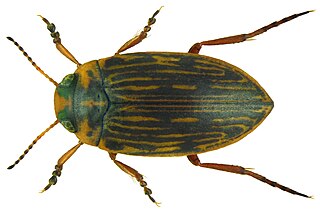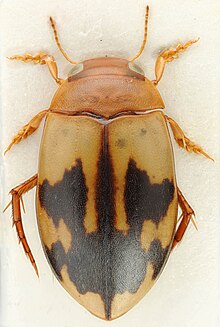
The Dytiscidae – based on the Greek dytikos (δυτικός), "able to dive" – are the predaceous diving beetles, a family of water beetles. They occur in virtually any freshwater habitat around the world, but a few species live among leaf litter. The adults of most are between 1 and 2.5 cm (0.4–1.0 in) long, though much variation is seen between species. The European Dytiscus latissimus and Brazilian Megadytes ducalis are the largest, reaching up to 4.5 and 4.75 cm respectively. In contrast, the smallest is likely the Australian Limbodessus atypicali of subterranean waters, which only is about 0.9 mm (0.035 in) long. Most are dark brown, blackish, or dark olive in color with golden highlights in some subfamilies. The larvae are commonly known as water tigers due to their voracious appetite. They have short, but sharp mandibles and immediately upon biting, they deliver digestive enzymes into prey to suck their liquefied remains. The family includes more than 4,000 described species in numerous genera.

Hygrotus is a genus of beetle in family Dytiscidae. It contains two subgenera and about 70 species, including:

Ilybius is a large genus of predatory aquatic beetles in the family Dytiscidae. The genus is native to the Palearctic, the Near East, the Nearctic, and North Africa. 70 species has been described from this genus:

Hydaticus is a genus of predatory water beetle belonging to the family Dytiscidae. Hydaticus can be found throughout most of the world. There are 150 described species and 12 subspecies in two subgenera in the genus Hydaticus.

Cybister, is a genus of beetle in family Dytiscidae. They are found in much of the world, including all continents except Antarctica. As of 2021 there are 96 species and 9 additional subspecies among four subgenera in the genus.

Prodaticus is a subgenus of beetles of the genus Hydaticus in the family Dytiscidae. These 143 species are in the subgenus Prodaticus:
Brachyvatus is a genus of beetles in the family Dytiscidae, containing the following species:
Neoclypeodytes is a genus of beetles in the family Dytiscidae found in North and Central America, containing the following species:
Uvarus is a genus of beetles in the family Dytiscidae, containing the following species:

Antiporus is a genus of beetles in the family Dytiscidae, first described in 1882 by David Sharp, which contains the following species:

Chostonectes is a genus of beetles in the family Dytiscidae, containing the following species:

Necterosoma is a genus of beetles in the family Dytiscidae, containing the following species:
Paroster is a genus of beetles in the family Dytiscidae, containing the following species:

Sanfilippodytes is a genus of beetles in the family Dytiscidae, containing the following species:

Sternopriscus is a genus of beetles in the family Dytiscidae, containing the following species:

Stictotarsus is a genus of beetles in the family Dytiscidae.
Desmopachria is a genus of beetles in the family Dytiscidae, containing the following species:
Batrachomatus is a genus of beetles in the family Dytiscidae, containing the following species:
Metaxydytes is a genus of beetles in the dytiscid subfamily Cybistrinae that occur in the Neotropics. The genus contains nine species; they were previously classified in the genus Megadytes.
Trifurcitus is a genus of beetles in the dytiscid subfamily Cybistrinae that occur in the Neotropics. The genus contains six species that were previously classified in the genus Megadytes.












